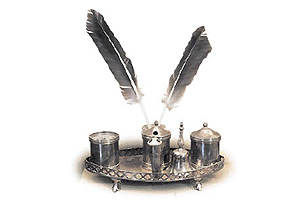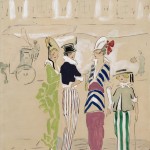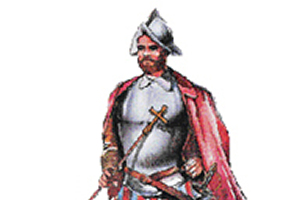He was born in Santiago, on June 16th of 1973; he was the son of Jose Santiago Portales Larrain and Maria Fernandez Palazuelos.
First, he entered to study in the Carolino Convictorio and later he studied law in the Instituto Nacional (National Institute). However, in 1817, he left the classrooms to become a tester of metals in the Casa de Moneda.
In July of 1821, he abandoned this work and dedicated to commerce; he founded a house in Valparaiso and established a branch office in Peru; it was the famous firm of Cea y Portales, existence which was related with the group denominated “los estanqueros”, due to the fact that, in 1824, they obtained the monopoly (cigar store) of tobacco and other species.
His interest in politics began in Peru, and his ideas were reflected on the aspirations of many conservative politicians.
In 1829, the civil war broke out amongst pipiolo groups (liberals) and pelucones (conservatives headed by Jose Joaquin Prieto). The latter were supported by the estanqueros of Portales.
Influential Minister
When the country was still at civil war, the newly president Jose Tomas Ovalle called Portales to pledge as the interior, External Relations and War and Navy minister (April 6th 1830). Eleven days after, the Lircay battle broke out, with the conservatives achieving the triumph.
Portales remained in the government of Joaquin Prieto and was named vice-president (1830).
In this position he executed all of his influence in the marching of the nation. He suspended many military chiefs, created the Civic Guard and controlled the opposing press. In 1832, he abandoned his ministerial labors and accepted the position of governor of Valparaiso.
Despite straying away, he continued to strongly influence national politics. The Constitution of 1833 was a proof of this, in which he didn’t intervened directly in its drafting, but he shaped his ideas to establish an impersonal and strong regime. In addition, the minister of the interior, Joaquin Tocornal, convinced president Prieto to consult Portales on many subjects.
This influence was pushed off by Manuel Rengifo, who was an efficient Finance minister, and defended by Tocornal. This discussion ended when Prieto named Portales as War minister (1835), who maintained that position when also assuming the Interior after Tocornal replaced Rengifo in Finance.
War against the Peru-Bolivian Confederation
Portales favored the war, when Peru and Bolivia were forming the Peru-Bolivian Confederation (directed by Andres Santa Cruz), because he saw it as a threat to Chile. The war was declared on December 28th of 1836.
The decision of the minister to declare the war against the confederation had many enemies, because not even the president himself was convinced of it. In addition, the extreme measures of Portales soon won the criticism of many of the soldiers, who didn’t understand the causes of the conflict.
It has been sustained, but without being confirmed, that the conspiracies of Santa Cruz through the infiltrations in Chile gave way to the mutiny of Quillota, headed by colonel Jose Antonio Vidaurre.
This brought the imprisonment of Portales as the consequence, while he was reviewing the troops in that place, on June 3rd of 1837. During his transfer to Valparaiso, which was ordered by Vidaurre, the mutineers were defeated by the forces that were loyal to the minister, in the Baron hill, on June 6th of 1837. Captain Santiago Florin, who was in charge of the piquet that was guarding Portales, ordered the execution upon receiving the news of the defeat.
After the shootings, Portales death was assured with bayonets, thus dying at the age of 44.








